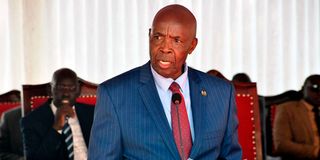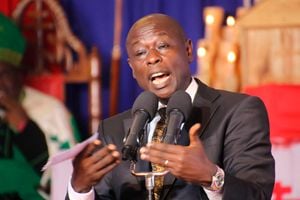How to manage education in 2024 and beyond

Education Cabinet Secretary Ezekiel Machogu makes his remarks during the release of the 2022 Kenya Certificate of Secondary Education (KCSE) exam results on January 20, 2023, at Mitihani House. Public primary school pupils find it a challenge to outperform their counterparts in academies.
As 2023 comes to a close, it is imperative that education stakeholders take stock of the challenges and successes in the sector to inform themselves of the policies, programmes and activities that would have to be undertaken in 2024 and beyond. Thus the government would have to chaperon them as it builds consensus on a wide field of issues.
These include the necessary legal framework to manage education; the appropriate management structure of the ministry, from the headquarters to the school level; the funding arrangements of every level of education; and the necessary reforms in a resurgent technical and vocational education and training sub-sector.
Others are the salvaging of public universities from the state of malaise, especially due to historical funding deficits; and the increasing roles of the private sector in the provision of education and its effects on equity among the populace.
This year is historical in the sector. The first cohort of the Competency-Based Curriculum (CBC) students joined junior secondary school (JSS); the last cohort of 8-4-4 pupils sat KCPE to complete primary school; and the government employed a record 56,000 mixture of permanent and pensionable and intern teachers. In addition, a new university funding model was launched and the Presidential Working Party on Education Reform (PWPER) released its report.
But it is this report more than anything else that will guide the sector for the next decade and beyond. The priority area to tackle next year, besides obtaining parliamentary approval for the implementation of the PWPER recommendations, is the legal framework for it.
The sector is in a situation similar to the 2010-2012 period that required a review of its laws to align them to the then-new Constitution. It took the guidance of then-Education Minister Mutula Kilonzo and support of the National Assembly Committee on Education, under the chairmanship of David Koech to enact a slew of legislation in quick succession in time for the 2013 General Election. These included the Teachers Service Commission (TSC) Act, 2012, the Basic Education Act, 2013, the Kenya Institute of Curriculum Development (KICD) Act, 2013 and the Technical and Vocational Education and Training (TVET) Act, 2013.
Education Cabinet Secretary Ezekiel Machogu and the Julius Melly-led National Assembly Committee on Education will have to take a leaf from their predecessors in 2012-2013 to ensure the exercise commences at the dawn of the new year.
Interestingly, a Bill to amend the Education Act, 2013 through a private motion by a member of the National Assembly has been gazetted. Curiously, it refers extensively to the National Education Board, whose scrapping the PWPER has recommended.
The CS needs immense support from the Attorney-General and the National Assembly lest the ministry wobble in carrying out the reform.
Mr Sogomo, an education expert, is a former Secretary of TSC. [email protected]. @BSogomo





